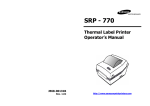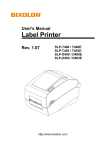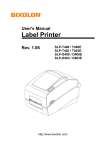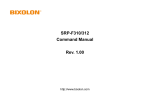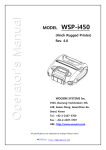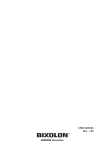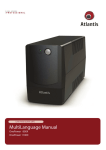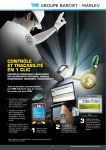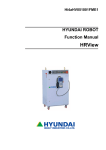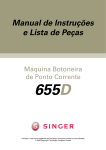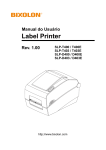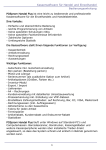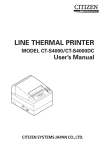Download Bixolon SRP-770II
Transcript
Programming Manual
SLCS
Rev. 1.24
SRP-770 / 770II / 770IIE
SLP-T400 / T400E
SLP-T403 / T403E
SLP-D400 / D400E
SLP-D403 / D403E
SLP-T400R / T403R
http://www.bixolon.com
SLCS Programming Manual
■ Table of Contents
1. Foreword ........................................................................................................................4
1-1 Image Buffer Configuration .....................................................................................5
1-2 Information for calculating position on image buffer............................................6
1-3 Command List...........................................................................................................8
1-4 Programming Considerations ...............................................................................10
2. Detail Description ........................................................................................................11
2-1 Commands for Designing a Label......................................................................... 11
2-1-1 T (Text String) .....................................................................................................12
2-1-2 V (Text String Vector Font)..................................................................................15
2-1-3 B1 (1 Dimensional bar code) ..............................................................................18
2-1-4 B2 (2 Dimensional bar code) ..............................................................................21
2-1-5 B3 (Special Barcode)..........................................................................................25
2-1-6 BD (Block Draw) .................................................................................................26
2-1-7 CD (Circle Draw) ................................................................................................29
2-1-8 CS (Character Set selection) ..............................................................................30
2-1-9 P (Print) ..............................................................................................................33
2-2 Media & Buffer Related Commands ......................................................................35
2-2-1 ST (Set Printing Type) ........................................................................................36
2-2-2 SM (Set Margin) .................................................................................................36
2-2-3 SF (Set Back-Feed Option) ................................................................................38
2-2-4 SL (Set Length) ..................................................................................................39
2-2-5 SW (Set Width)...................................................................................................42
2-2-6 SB (Set Buffer mode) .........................................................................................43
2-2-7 CB (Clear Buffer) ................................................................................................43
2-3 Printer Setting Commands ....................................................................................44
2-3-1 SS (Set Speed)...................................................................................................45
2-3-2 SD (Set Density).................................................................................................45
2-3-3 SO (Set Orientation) ...........................................................................................46
2-3-4 SP (Set Port) ......................................................................................................47
2-3-5 SA (Set Offset)....................................................................................................48
2-3-6 TA (Tear-off/Cutter Position Setting) ...................................................................48
2-4 Variable Related Commands .................................................................................48
2-4 Variable Related Commands .................................................................................49
2-4-1 SC (Set Counter) ................................................................................................50
2-4-2 AC (Auto Counter) ..............................................................................................51
2-4-3 SV (Set Variable) ................................................................................................52
2-4-4 ? (Get Variables).................................................................................................53
2-4-5 PV (Print with Variables) .....................................................................................54
2-5 Template Related Commands................................................................................55
2-5-1 TS (Template store Start)....................................................................................56
2-5-2 TE (Template store End).....................................................................................56
2-5-3 TR (Template Recall) ..........................................................................................57
2-5-4 TD (Template Delete) .........................................................................................58
2-5-5 TI (Template Information)....................................................................................58
Rev. 1.24
-2-
SLCS Programming Manual
2-6 Image Related Commands .....................................................................................59
2-6-1 IS (Image Store) .................................................................................................60
2-6-2 IR (Image Recall)................................................................................................60
2-6-3 ID (Image Delete) ...............................................................................................61
2-6-4 II (Image Information) .........................................................................................61
2-6-5 LD.......................................................................................................................62
2-6-6 LC.......................................................................................................................64
2-6-7 BMP....................................................................................................................66
2-7 Downloadable font Related Commands ...............................................................67
2-7-1 DT (Download True Type Font) ..........................................................................68
2-7-2 DD (Downloaded font Delete).............................................................................69
2-7-3 DI (Downloaded font Information).......................................................................70
2-8 The Others...............................................................................................................71
2-8-1 @ (Initialize Printer) ............................................................................................72
2-8-2 PI (Printer Information) .......................................................................................72
2-8-3 CUT (Auto-cutter Enable/Disable) ......................................................................73
2-8-4 ^cp (Check Printer Status and Report 2 bytes)...................................................74
2-8-5 ^cu (Check Printer Status and Report 1 byte).....................................................75
2-8-6 ^PI (Send Printer information to host).................................................................76
3. Programming Example................................................................................................77
3-1 Example) T_resident...............................................................................................77
3-2 Example) T_Rotate4 ...............................................................................................78
3-3 Example) V_resident ..............................................................................................79
3-4 Example) V_Rotate4 ...............................................................................................80
3-5 Example) Code39....................................................................................................81
3-6 Example) BD1 .........................................................................................................82
3-7 Example) BD3 .........................................................................................................83
3-8 Example) BD4 .........................................................................................................85
3-9 Example) BD5 .........................................................................................................86
3-10 Example) Slope .....................................................................................................87
3-11 Example) SW&SL ..................................................................................................88
3-12 Example) TEST00_TS ...........................................................................................90
3-13 Example) TEST00_TR...........................................................................................91
3-14 Example) TEST04_TS ...........................................................................................92
3-15 Example) TEST04_TR...........................................................................................93
3-16 Example) IR1 .........................................................................................................93
3-17 Example) TEST10_TS ...........................................................................................94
3-18 Example) TEST10_TR...........................................................................................94
3-19 Example) TEST11_TS ...........................................................................................95
3-20 Example) TEST11_TR ...........................................................................................95
3-21 Example) SLCS_BIXOLON...................................................................................96
Rev. 1.24
-3-
SLCS Programming Manual
1. Foreword
In this chapter, the basic concept of SLCS and some information necessary for the
programmer to use SLCS will be explained. Please read this part before starting
programming for efficient and easy use of BIXOLON Label Printers..
We at BIXOLON maintain ongoing efforts to enhance and upgrade the functions and
quality of all our products. In following, product specifications and/or user manual content
may be changed without prior notice.
Rev. 1.24
-4-
SLCS Programming Manual
1-1 Image Buffer Configuration
1) Maximum size
A) When using Double Buffering Function
832dots × 1216dots (104mm × 152mm) = 4 inch × 6 inch
B) When using Single Buffering Function
832dots × 2432dots (104mm × 304mm) = 4 inch × 12 inch
2) Dot size : 0.125mm(W) × 0.125mm(H) (203dpi)
832 dots(104mm = 4inch)
…
.
.
.
.
…
.
…
Image Buffer
Rev. 1.24
-5-
1216 dots(152mm = 6inch)
.
.
.
SLCS Programming Manual
1-2 Information for calculating position on image buffer
1) Relation between position and number of dots
Inch
mm
dots
0.04
1
8
0.40
1.00
1.25
1.50
1.75
2.00
2.25
10.00
25.40
31.75
38.10
44.45
50.80
57.15
80
203
254
305
355
406
457
2.50
63.50
508
2.75
69.85
556
3.00
76.20
610
4.00
101.6
813
2) Font Information
Font name
0
1
2
3
4
5
6
7
8
9
Korean a
Korean b
Korean c
Korean d
Korean e
Korean f
GB2312 m
BIG5 n
Vector
Rev. 1.24
Width × Height (dots)
09 ×15
12 × 20
16 × 25
19 × 30
24 × 38
32 × 50
48 × 76
22 × 34
28 × 44
37 × 58
16 × 16(ascii:9×15)
24 × 24(ascii:12×24)
20 × 20(ascii:12×20)
26 × 26(ascii:16×30)
20 × 26(ascii:16×30)
38 × 38(ascii:22×34)
24 × 24(ascii:12×24)
24 × 24(ascii:12×24)
Scalable
-6-
Resolution
203 dpi
SLCS Programming Manual
3) Example of text and barcode
Direction of x axis
(0.0)
Direction of y axis
(124 , 160)
(503 , 160)
BIXONOL
SRP770
(124 , 356)
4) Example of rotation
Direction of x axis
(0.0)
Start Position
0°
Start Position
90°
Direction
ABCD
ABCD
of y axis
ABCD
Start Position
270°
Rev. 1.24
Start Position
180°
-7-
SLCS Programming Manual
1-3 Command List
Command
Description
Remarks
1. Commands for Designing Label
T
Text
Draw text string on the image buffer
V
Text (Vector Font)
Draw text string on the image buffer
B1
1d barcode
Draw 1D Barcode on the image buffer
B2
2d barcode
Draw 2D Barcode on the image buffer
B3
Special barcode
Draw special barcode on the image buffer
BD
Block Draw
Draw line or box on the image buffer
CD
Circle Draw
Draw circle on the image buffer
CS
Character Set selection
Select international code table
Print
Start printing the content of image buffer
P
2. Media & Buffer related Commands
ST
Set Print Type
Select Thermal Direct / Transfer printing
SM
Set Margin
Set the marginal value of the image buffer
SF
Set Back-feed Option
Set back-feeding option
SL
Set Label Length
Set length of label
SW
Set Label Width
SB
Set Buffer mode
CB
Clear Buffer
Set length of label
Enable or Disable double buffering
function
Clear image buffer
3. Printer Setting Commands
SS
Set Speed
Set printing speed
SD
Set Density
Set printing density from level 0 to 20
SO
Set Orientation
Set printing direction
SP
Set serial Port
Set serial port configurations
SA
Set Offset
Set offset value
TA
Set Tear-off/Cut
Set Tear-off/Cut value
4. Variable related Commands
SC
Set Counter
Used in Template sequence
AC
Set Counter
Used in normal mode
SV
Set Variable
Used in Template sequence
?
Get variables
Get content of variables and counters
Print with Variable
Use this command in Template
PV
Rev. 1.24
-8-
Page
SLCS Programming Manual
Command
Description
Remarks
5. Template Related Commands
TS
Template store Start
TE
Template store End
TR
Template Recall
TD
Template Delete
TI
Template Information
All contents between these commands are
saved in printer memory
Load and reuse the stored Template
Delete stored Template from printer
memory
Print the list of currently stored Templates
6. Image Data Related Commands
IS
Image Store
PCX format image file can be stored
IR
Image Recall
Load and reuse the stored image
ID
Image Delete
Delete stored image
II
Image Information
LD
LC
BMP
Print the list of currently stored images
Draw bitmap image data on the image
Bitmap data draw
buffer
Compression bitmap data Draw compression bitmap image data on
specific position of image buffer
draw
BMP format file draw
Draw BMP format file on the image buffer
7. Downloadable Font Related Commands
DS
Download Bitmap font
User made Bitmap font
DT
Download True Type font
Windows system font used
DD
Downloadable font Delete
Downloadable font
Information
Delete downloaded font
DI
Print the list of currently stored images
8. The Others
@
Reset printer
PI
Printer Information
Initialize the printer
^cp
Print current setting of printer
Cutting is executed after Printing is finished
Enable/Disable Cutter option if cutting option is enabled by this
command
Check Printer Status
Return 2 bytes status values to host
^cu
Check Printer Status
Return 1 byte status value to host
^PI
Send Printer information
Send various information to host
CUT
Rev. 1.24
-9-
Page
SLCS Programming Manual
1-4 Programming Considerations
1) All commands are case-sensitive and some commands require one or more parameters
and ‘Data’.
2) Command Conventions
Tp1,p2,p3,p4,p5,p6,p7,p8,p9,’TEXT DATA’
Parameters
Command Specific Data
Command
3) Each command line must be terminated with a ‘CR’(0Dh, 13) + ‘LF’(0Ah,10).
4) The commands which draw text, barcode, lines… just draw on the image buffer, they do
not start printing. The printer will start printing when the P command comes.
! Caution
The ‘P’ command must be terminated by ‘CR’(0x0d). If not, the printer will not start
printing until ‘CR’ comes.
Rev. 1.24
- 10 -
SLCS Programming Manual
2. Detail Description
2-1 Commands for Designing a Label
These commands are used to design a label by providing text, barcode, line, box… and to
print content of image buffer on media.
1) T
Draw Text String on the image buffer.
2) V
Draw Text (Vector Font) String on the image buffer.
3) B1
Draw 1D Barcode on the image buffer.
4) B2
Draw 2D Barcode on the image buffer.
5) B3
Draw Special Barcode on the image buffer.
6) BD
Draw Line, Block, Box & Slope on the image buffer.
7) CD
Draw Circle on the image buffer.
8) CS
Set Code page and ICS(International Character Set).
9) P
Start printing the content of the image buffer.
Rev. 1.24
- 11 -
SLCS Programming Manual
2-1-1 T (Text String)
Description
Draw text string on the image buffer
Syntax
Tp1,p2,p3,p4,p5,p6,p7,p8,p9(,p10),’DATA’
Parameters
p1 : Horizontal position (X) [dot]
p2 : Vertical position (Y) [dot]
p3 : Font selection
Value
Font Size(pt)
Width × Height(dots)
0
1
2
3
4
5
6
7
8
9
a
b
c
d
e
f
m
n
j
6
8
10
12
15
20
30
14
18
24
KOREAN 1
KOREAN 2
KOREAN 3
KOREAN 4
KOREAN 5
KOREAN 6
GB2312
BIG5
Shift JIS
9 × 15
12 × 20
16 × 25
19 × 30
24 × 38
32 × 50
48 × 76
22 × 34
28 × 44
37 × 58
16 × 16 (ascii 9×15)
24 × 24 (ascii 12×24)
20 × 20 (ascii 12×20)
26 × 26 (ascii 16×30)
20 × 26 (ascii 16×30)
38 × 38 (ascii 22×34)
24 × 24 (ascii 12×24)
24 × 24 (ascii 12×24)
24 × 24 (ascii 12×24)
♣ A to Z are assigned to Downloadable font. Refer to DS command.
p4 : Horizontal multiplier : 1 ~ 4
p5 : Vertical multiplier : 1 ~ 4
p6 : Right-side character spacing [dot]
Plus(+)/Minus(-) option can be used. Ex) 5, +3, -10…
p7 : Rotation
Value
0
1
2
3
Rotation
No Rotation
90 degrees
180 degrees
270 degrees
p8 : Reverse printing
N : Normal printing
Rev. 1.24
R : Reverse printing
- 12 -
SLCS Programming Manual
p9 : Bold
N : Normal
B : Bold
p10 : Text Alignment(Optional)
F : p1 means the position of the first character in text string - Left alignment
L : p1 means the position of the last character in text string - Right alignment
R: Write text sting form right to left.
(BIXOLON → NOLOXIB)
♣ This parameter is for alignment of text lines.
‘DATA’ : The various data types can be used in the data field as followings.
1) Fixed text string : ‘ Text String’
2) Variables declared in template by SV command : Vnn
3) Counters declared by the SC command : Cn
♣ 1) , 2) and 3) can be mixed together
Example
T50,100,3,1,1,0,0,N,N,’ BIXOLON Label Printer’
T50,100,3,1,1,0,0,N,N,’Manufacturer :’V00
T50,100,3,1,1,0,0,N,N,V00
T50,100,3,1,1,0,0,N,N,’Manufacturer :’C0
T50,100,3,1,1,0,0,N,N,C0
♣ If you want to print ’ or \ then you must type like \’ or \\ .
Rev. 1.24
- 13 -
SLCS Programming Manual
Example
SM20,20
T26,20,0,0,0,0,0,N,N,’Font- 6 pt’
T26,49,1,0,0,0,0,N,N,’Font - 8 pt’
T26,81,2,0,0,0,0,N,N,’Font - 10 pt’
T26,117,3,0,0,0,0,N,N,’Font - 12 pt’
T26,156,4,0,0,0,0,N,N,’Font - 15 pt’
T26,200,5,0,0,0,0,N,N,’Font - 20 pt’
T26,252,6,0,0,0,0,N,N,’Font - 30 pt’
P1
Result
Font – 6 pt
Font – 8 pt
Font – 10 pt
Font – 12 pt
Font – 15 pt
Font – 20 pt
Font – 30 pt
Rev. 1.24
- 14 -
SLCS Programming Manual
2-1-2 V (Text String Vector Font)
Description
Draw text (Vector Font) string on the image buffer
Syntax
Vp1,p2,p3,p4,p5,p6,p7,p8,p9,p10,p11,p12, ’DATA’
Parameters
p1 : Horizontal position (X) [dot]
p2 : Vertical position (Y) [dot]
p3 : Font selection
U: ASCII (1Byte code)
K: KS5601 (2Byte code)
B: BIG5 (2Byte code)
G: GB2312 (2Byte code)
J: Shift-JIS (2Byte code)
p4 : Font width (W)[dot]
p5 : Font height (H)[dot]
p6 : Right-side character spacing [dot]
Plus (+)/Minus (-) option can be used. Ex) 5, +3, -10…
P7 : Bold
N : Normal
B : Bold
p8 : Reverse printing
N: Normal printing
R: Reverse printing
P9 : Text style
N: Normal
I: Italic
P10 : Rotation
Value
0
1
2
3
Rotation
No Rotation
90 degrees
180 degrees
270 degrees
p11: Text Alignment (Optional)
L: p1 means the position of the first character in the text string - Left alignment
R: p1 means the position of the last character in the text string - Right alignment
C: p1 means the position of the center character in the text string - Center alignment
Rev. 1.24
- 15 -
SLCS Programming Manual
p12: Text string write direction
0: Write text string form left to right (BIXOLON)
1: Write text string form right to left (NOLOXIB)
‘DATA’: The various data types can be used in the data field as follows.
1) Fixed text string: ‘Text String’
2) Variables declared in template by SV command: Vnn
3) Counters declared by the SC command: Cn
♣ 1), 2), and 3) can be mixed together.
Example
V50,100,U,25,25,+1,N,N,N,0,L,0,'BIXOLON Label Printer'
V50,200,U,35,35,-1,N,N,N,0,L,0, ’Manufacturer :’V00
V50,300,U,35,35,+1,B,R,I,0,L,0, V00
V50,400,U,45,25,+1,N,N,N,0,L,0,'Vector Font Test' C0
V50,500,U,25,45,+1,N,N,N,0,L,0, C0
♣
Rev. 1.24
To print ’ or \, \’ or \\ must be typed.
- 16 -
SLCS Programming Manual
Example
V50,100,U,25,25,+1,N,N,N,0,L,0,'Vector Font Test'
V50,200,U,35,35,-1,N,N,N,0,L,0,'Vector Font Test'
V50,300,U,35,35,+1,B,R,I,0,L,0,'Vector Font Test '
V50,400,U,45,25,+1,N,N,N,0,L,0,'Vector Font Test'
V50,500,U,25,45,+1,N,N,N,0,L,0,'Vector Font Test'
V50,700,U,65,65,+1,N,N,N,0,L,0,'ABCDEFGHIJKLMNO'
V50,900,U,65,65,+1,N,N,N,0,L,0,'abcdefghijklmno'
P1
Result
Rev. 1.24
- 17 -
SLCS Programming Manual
2-1-3 B1 (1 Dimensional bar code)
Description
Draw 1D Barcode on the image buffer
Syntax
B1p1,p2,p3,p4,p5,p6,p7,p8(,p9),’DATA’
Parameters
p1 : Horizontal position (X) [dot]
p2 : Vertical position (Y) [dot]
p3 : Barcode selection
p3
0
1
2
3
4
Barcode
Code39
Code128
I2of5
Codabar
Code93
p3
5
6
7
8
9
p4 : Narrow bar width [dot]
p5 : Wide bar width [dot]
p6 : Bar code height [dot]
p7 : Rotation
Value
0
1
2
3
Rotation
No Rotation
90 degrees
180 degrees
270 degrees
p8 : HRI (Human Readable Interpretation)
0 : Not printed
1 : Below the bar code(Font Size : 1)
2 : Above the bar code(Font Size : 1)
3 : Below the bar code(Font Size : 2)
4 : Above the bar code(Font Size : 2)
5 : Below the bar code(Font Size : 3)
6 : Above the bar code(Font Size : 3)
7 : Below the bar code(Font Size : 4)
8 : Above the bar code(Font Size : 4)
(p9) : quiet zone width(optional) : 0 ~ 20
Rev. 1.24
- 18 -
Barcode
UPC-A
UPC-E
EAN13
EAN8
UCC/EAN128
SLCS Programming Manual
♣ Quiet zone is added to the front and end of the barcode for safe scanning.
Because of the quiet zone, the barcode seems to be seen drawn in incorrect
position. If p9 is not used, the printer automatically sets parameter to 0.
Quiet zone with = p9 × narrow bar width(p4)
‘DATA’ : The various data types can be used in the data field as followings.
1) Fixed text string : ‘ Text String’
2) Variable declared in template by SV command : Vnn
3) Counter declared by the SC command : Cn
4) In the Code 128, when send data to printer if codeset selection commands
(>A,>B,>C) will be used codeset can be selected.
By using >A, Codeset will be set Codeset A.
By using >B, Codeset will be set Codeset B.
By using >C, Codeset will be set Codeset C.
If Codeset select command is not used, automatically set to Auto-mode.
♣ 1) , 2) and 3) can be used together
Example
B178,196,0,2,6,100,0,0,’1234567890’
B178,196,0,2,6,100,0,0,V00
B178,196,0,2,6,100,0,0,C0
B178,196,1,2,6,100,0,0,’>A1234567890’
B178,196,1,2,6,100,0,0,’>B1234567890’
B178,196,1,2,6,100,0,0,’>C1234567890>A5’
Rev. 1.24
- 19 -
SLCS Programming Manual
Example
SM20,20
//Caution:The position is not (178,196) but
B178,196,0,2,6,100,0,0,’1234567890’
(78,196)
B150,468,0,4,10,200,0,0,’1234567890’
P1
Result
Rev. 1.24
- 20 -
SLCS Programming Manual
2-1-4 B2 (2 Dimensional bar code)
Description
Draw 2D Barcode on the image buffer
Syntax
B2p1,p2,p3……’DATA’
Parameters
p1 : Horizontal position (X) [dot]
p2 : Vertical position (Y) [dot]
p3 : 2D barcode selection
p3
M
P
Q
D
2D Barcode
MaxiCode
PDF417
QR Code
Data Matrix
♣♣ Following parameters (p4, p5 …. ,Data) are barcodes-specific.
See the following pages for details of each 2D barcodes.
Rev. 1.24
- 21 -
SLCS Programming Manual
Maxicode(When p3 is M)
p1 : Horizontal position (X) [dot]
p2 : Vertical position (Y) [dot]
p3 : M (means ‘Maxicode’)
p4 : Mode selection
p4
0
2
3
4
Rotation
Mode0
Mode2
Mode3
Mode4
‘DATA’ : Data format is dependent on ‘Mode’
Mode
0
2 or 3
4
Data Format
‘cl,co,pc,lpm’
‘lpm’
cl : Class Code(3 digits)
co : Country Code(3digits)
Mode2 : Numeric Characters
Mode3 : International Characters
pc : Postal Code
lpm : Low priority message(data)
Example
1)Mode 0
B2200,200,M,0,’999,840,06810,7317,THIS IS A TEST OF MODE 0 STRUCTURED
CARRIER MESSAGE ENCODING. THIS IS AN 84 CHAR MSG’
2)Mode 2
B2200,200,M,2,’999,840,06810,7317,THIS IS A TEST OF BIXOLON LABEL PRINTER
SRP770. MODE 2 ENCODING. THIS IS AN 84 CHAR.’
3)Mode3
B2200,200,M,3,’999,056,B1050,7317,THIS IS A TEST OF BIXOLON LABEL PRINTER
SRP770. MODE 3 ENCODING. THIS IS AN 84 CHAR.’
4)Mode4
B2200,200,M,4,’THIS IS A 93 CHARACTER CODE SET A MESSAGE THAT FILLS A
MODE 4, UNAPPENDED, MAXICODE SYMBOL...’
Rev. 1.24
- 22 -
SLCS Programming Manual
PDF417(When p3 is P)
p1 : Horizontal position (X) [dot]
p2 : Vertical position (Y) [dot]
p3 : P (means ‘PDF417’)
p4 : Maximum Row Count : 3 ~ 90
p5 : Maximum Column Count : 1 ~ 30
p6 : Error Correction level
p6
0
1
2
3
4
5
6
7
8
EC Level
0
1
2
3
4
5
6
7
8
EC Codeword
2
4
8
16
32
64
128
256
512
p7 : Data compression method
p7
0
1
2
Data Type
Text
Numeric
Binary
Compression
2 Characters per codeword
2.93 Characters per codeword
1.2 Bytes per codeword
p8 : HRI
0 : Not Printed
1 : Below the barcode
p9 : Barcode origin point
0 : Center of barcode
1 : Upper left corner of barcode(default)
p10 : Module Width : 2 ~ 9
p11 : Bar Height : 4 ~ 99
p12 : Rotation
Value
0
1
2
3
Rotation
No Rotation
90 degrees
180 degrees
270 degrees
‘DATA’ : ASCII data or Binary data.
Example
B2100,750,P,30,5,0,0,1,1,3,10,0,’ BIXOLON Label Printer SRP770’
(100,750)
Rev. 1.24
- 23 -
//
The
position
is
SLCS Programming Manual
QR Code(When p3 is Q)
p1 : Horizontal position (X) [dot]
p2 : Vertical position (Y) [dot]
p3 : Q (means ‘QR Code’)
p4 : MODEL selection
1 : MODEL1
2 : MODEL2
p5 : ECC Level
p6
L
M
Q
H
Recovery Rate
7%
15%
25%
30%
p6 : Barcode Size : 1~4
p7 : Rotation
Value
0
1
2
3
Rotation
No Rotation
90 degrees
180 degrees
270 degrees
‘DATA’ : ASCII data or Binary data.
Example
B2200,100,Q,2,M,4,0,'ABCDEFGHIJKLMN1234567890'
// The position is (200,100)
Data Matrix(When p3 is D)
p1 : Horizontal position (X) [dot]
p2 : Vertical position (Y) [dot]
p3 : D (the ECC 200 data quality format)
p4 : Barcode Size : 1 ~ 4;
P5 : Reverse
N: Normal
R: Reverse(or Inverse) – Reverse Video or Negative image
(P6) : Rotation
Value
0
1
2
3
Rotation
No Rotation
90 degrees
180 degrees
270 degrees
‘DATA’ : ASCII data or Binary data.
Example
B2200,100,D,2,N,'BIXOLON Label Printer'
Rev. 1.24
// The position is (200,100)
- 24 -
SLCS Programming Manual
2-1-5 B3 (Special Barcode)
Description
Draw Special Barcode on the image buffer
Syntax
B3p1,p2,p3……’DATA’
Parameters
p1 : Horizontal position (X) [dot]
p2 : Vertical position (Y) [dot]
p3 : Special barcode selection
p3
I
Special Barcode
IMB(Intelligent Mail Barcode)
♣♣ Following parameters (p4, p5 …. ,Data) are barcodes-specific.
See the following pages for details of each special barcodes.
IMB (p3 = I)
p1 : Horizontal position (X) [dot]
p2 : Vertical position (Y) [dot]
p3 : I (means ‘IMB’)
p4 : Rotation
Value
0
1
2
3
Rotation
No Rotation
90 degrees
180 degrees
270 degrees
P5 : HRI :
0 : Not Printed
1 : Below the barcode
‘DATA’ : ASCII data or Binary data.
Example
B3100,100,I,0,1,'0123456709498765432101234567891'
Rev. 1.24
- 25 -
// The position is (100,100)
SLCS Programming Manual
2-1-6 BD (Block Draw)
Description
Draw Line, Block, Box & Slope on the image buffer
Syntax
BDp1,p2,p3,p4,p5(,p6)
Parameters
p1 : Horizontal start position (X) [dot]
p2 : Vertical start position (Y) [dot]
p3 : Horizontal end position (X) [dot]
p4 : Vertical end position (Y) [dot]
p5 : Options
p5
O
E
D
S
B
Type
Line Overwriting
Line Exclusive OR
Line Delete
Slope(a oblique line)
Box
Additional p6
Not necessary
Not necessary
Not necessary
Thickness
Thickness
♣ If p5 is S or B, then additional p6 must follow p5.
Rev. 1.24
- 26 -
SLCS Programming Manual
Example
1) Start and end position
(p1,p2)
(p3,p4)
2) Overwriting mode(when p5 is O)
3) Exclusive OR mode(when p5 is E)
4) Delete block mode(when p5 is D)
Rev. 1.24
- 27 -
SLCS Programming Manual
5) Slope block mode(when p5 is S)
(p1,p2)
p6 : Thickness
(p3,p4)
6) Draw box mode(when p5 is B)
(p1,p2)
p6 : Thickness
(p3,p4)
Rev. 1.24
- 28 -
SLCS Programming Manual
2-1-7 CD (Circle Draw)
Description
Draw Circle on the image buffer
Syntax
CDp1,p2,p3,p4
Parameters
p1 : Horizontal start position (X) [dot]
p2 : Vertical start position (Y) [dot]
p3 : Circle Size Selection
Value
1
2
3
4
5
6
Width × Height(dots)
40 × 40
56 × 56
72 × 72
88 × 88
104 × 104
168 × 168
Diameter (mm)
5
7
9
11
13
21
p4 : Multiplier : 1 ~ 4
Example
CD100,200,2,1
(100,200)
Circle size(diameter is 7mm)
Rev. 1.24
- 29 -
SLCS Programming Manual
2-1-8 CS (Character Set selection)
Description
To select international character set and code table.
Syntax
CSp1,p2
Parameters
p1 : International Character Set
p1
0
1
2
3
4
5
6
7
8
9
10
11
12
13
14
15
Rev. 1.24
Country
U.S.A
France
Germany
U.K
Denmark I
Sweden
Italy
Spain I
Norway
Denmark II
Japan
Spain II
Latin America
Korea
Slovenia/Croatia
China
- 30 -
SLCS Programming Manual
p2 : Code Pages
p2
0
1
2
3
4
5
6
Code Table
CP437
CP850
CP 852
CP 860
CP 863
CP 865
WCP 1252
7
CP 865 + WCP 1252
8
9
10
11
12
13
14
15
16
17
18
19
20
21
22
CP 857
CP 737
WCP 1250
WCP 1253
WCP 1254
CP 855
CP 862
CP 866
WCP 1251
WCP 1255
CP 928
CP 864
CP 775
WCP1257
CP858
Language
U.S.A
Latin1
Latin2
Portuguese
Canadian French
Nordic
Latin I
European
Combined
Turkish
Greek
Latin 2
Greek
Turkish
Cyrillic
Hebrew
Cyrillic
Cyrillic
Hebrew
Greek
Arabic
Baltic
Baltic
Latin 1 + Euro
♣ Default Setting is U.S.A standard (p1=0 and p2=0).
♣ European Combined Page
Address
0x80
0x81 ~ 0x9f
0xA0 ~ 0xff
Rev. 1.24
Code Page
Euro Currency
PC865
PC1252
- 31 -
SLCS Programming Manual
International Character Set
5C 5D
5Eh 60h
5Bh
h
h
91
92
93
94
96
123
7C
h
123
7D
h
125
126
`
{
|
}
~
^
`
é
ù
è
¨
Ü
^
`
ä
ö
ü
β
\
]
^
`
{
|
}
~
Æ
Ø
Å
^
`
æ
ø
å
~
É
Ä
Ö
Å
Ü
é
ä
ö
å
ü
$
@
°
\
é
^
ù
à
ò
è
ì
₧
$
@
і
Ñ
¿
^
`
¨
ñ
}
~
Norway
#
¤
É
Æ
Ø
Å
Ü
é
æ
ø
å
ü
Denmark II
#
$
É
Æ
Ø
Å
Ü
é
æ
ø
å
ü
Japan
#
$
@
[
¥
]
^
`
{
|
}
~
Spain II
#
$
á
¡
Ñ
¿
é
`
í
ñ
ó
ú
Latin America
#
$
á
¡
Ñ
¿
é
ü
í
ñ
ó
ú
Korea
#
$
@
[
\
]
^
`
{
|
}
~
Slovenia/Croatia
#
$
Ž
Š
Đ
Ć
Č
ž
š
đ
ć
č
China
#
¥
@
[
\
]
^
`
{
|
}
~
Country
Hex
23h
24h
40h
Dec
35
36
64
U.S.A
#
$
@
[
\
]
^
France
#
$
à
°
ç
§
Germany
#
$
§
Ä
Ö
U.K.
£
$
@
[
Denmark I
#
$
@
Sweden
#
¤
Italy
#
Spain
0
ASCII
Code
0~31 : Control Code
32~127 : Alphanumeric
0
0
1
16
2
32
3
48
4
64
5
80
6
96
7
112
1
2
3
4
5
6
7
8
7Bh
9
A
B
C
D
E
F
Control Characters
!
"
#
$ %
&
'
(
)
*
+
,
-
.
/
1
2
3
4
5
6
7
8
9
:
;
<
=
>
?
@ A
B
C
D
E
F
G
H
I
J
K
L
M
N
O
P
Q
R
S
T
U
V
W
X
Y
Z
[
]
^
_
`
a
b
c
d
e
f
g
h
i
j
k
l
m
n
o
p
q
r
s
t
u
v
w
x
y
z
{
|
}
~
⌂
0
※ Refer to the “Code Pages Manual” for more extension code pages table.
Rev. 1.24
7E
- 32 -
SLCS Programming Manual
2-1-9 P (Print)
Description
Let the printer start printing the content of image buffer
Syntax
Pp1,[p2]
Parameters
p1 : Number of label sets : 1 ~ 65535
p2 : Number of copies of each label : 1 ~ 65535
♣ The P command cannot be used in a template sequence. If printing command is needed
in template sequence, then use the PV command(See the example of next page).
! Caution
The ‘P’ command should be terminated by ‘CR’(0x0d). If not, the printer will not start
to print until ‘CR’ comes.
Rev. 1.24
- 33 -
SLCS Programming Manual
Example
(1) In case of Using P ( P is used outside of template sequence)
TS’TPL_TST1’
// Start Template Store
SV00,15,N,’Model Name :’
// Declare variable V00
T50,100,3,1,1,0,0,N,N,’Model Name :’V00 // T command with variable
TE
// End Template Store
TR’TPL_TST1”
// Recall stored template ‘TPL_TST1’
?
// Get content of variable used in recalled template
SRP770
// Content of variable V00
P3,2
// when using P command, It must not be inside
template,
// but be used after recalling the template and entering
the
// contents of all variables.
// After P command, printer starts printing.
(2) In case of Using PV(PV is used inside of template sequence
TS’TPL_TST1’
// Start Template Store
SV00,15,N,’Model Name :’
// Declare variable V00
SV01,2,N,’# of set :’
// Declare variable V01
SV02,2,N,’# of copies : ‘
// Declare variable V02
T50,100,3,1,1,0,0,N,N,’Model Name :’V00 // T command with variable
PVV01,V02
// PV command can be used inside the template
TE
// End Template Store
TR’TPL_TST1”
// Recall stored template ‘TPL_TST1’
?
// Get content of variable used in recalled template
SRP770
// Content of variable V00
3
// Content of variable V00
2
// Content of variable V00
// As soon as all contents of variables are entered’
// printer will starts printing
Rev. 1.24
- 34 -
SLCS Programming Manual
2-2 Media & Buffer Related Commands
1) ST
Select Thermal Direct/Transfer Printing.
2) SM
Set marginal value in label(Image buffer)
3) SF
Set back-feed option.
4) SL
Set label(Image buffer) length
5) SW
Set label(Image buffer) width
6) SB
Set buffer mode(Enable or disable Double Buffering)
7) CB
Clear Image Buffer
Rev. 1.24
- 35 -
SLCS Programming Manual
2-2-1 ST (Set Printing Type)
Description
Select Thermal Direct Printing or Thermal Transfer Printing.
Syntax
STp1
Parameters
p1 : Direct Thermal / Thermal Transfer
- d : Direct Thermal
- t : Thermal Transfer
2-2-2 SM (Set Margin)
Description
Set marginal value of the image buffer.
This command moves the origin point (0,0) to (p1,p2) and make (p1,p2) become the new
origin.
Syntax
SMp1,p2
Parameters
p1 : Horizontal margin [dots]
p2 : Vertical margin [dots]
♣ The origin point is upper-left point of the image buffer
Rev. 1.24
- 36 -
SLCS Programming Manual
** When printing orientation is from top to bottom
Image Buffer
New Image Buffer
(0,0) : Origin
(p1,p2) : New Origin
virtual (0,0)
Label Feeding
Direction
** When printing orientation is from bottom to top.
Label Feeding
Direction
virtual (0,0)
New Origin : (p1,p2)
Rev. 1.24
- 37 -
SLCS Programming Manual
2-2-3 SF (Set Back-Feed Option)
Description
Set back-feed option.
This command decides whether printer does back-feed action before starting printing.
Syntax
SFp1(,p2)
Parameters
p1 : Enable/Disable
- 0 : Disable back-feed option.
- 1 : Enable back-feed option(Default)
p2 : Back feeding step quantity.
- This parameter is valid when p1 is 1.
- The step quantity defined by user can’t exceed printer’s default feeding quantity.
- 0 means printer’s default feeding quantity.
♣ This option is useful for the continuous paper or black mark media with perforation line
away from black mark.
♣ The printer’s default back feeding step quantity depends on the printer models and
printer modes such as normal, peeler or cutter.
Examples)
SF0
→ Disable Printer’s back-feeding option.
SF1
→ Default quantity of Back feed is executed before printing.
SL1,0
→ Default quantity of Back feed is executed before printing.
SL1,100
→ 100 step’s Back feed is executed before printing.
SL0,100
→ Back feed is disabled and p2(100) is ignored.
Rev. 1.24
- 38 -
SLCS Programming Manual
2-2-4 SL (Set Length)
Description
Set length of label and gap(or Black Mark) and specify media type.
Syntax
SLp1,p2(,p3)(,p4)
Parameters
p1 : Label length [dots] : Maximum 2432 dots(12 inch)
♣ Double buffering feature can be used only when label length(p1) is less
than 1216(2432/2, 6inch) dots.
♣ If p1 is over 1216 dots, the double buffering feature will be automatically
released.
♣ So if you don’t use double buffering feature, you can design maximum
2432 dots(12 inch) size label.
p2 : Gap length or thickness of black line [dots]
p3 : Media Type
p3
G
C
B
Media type
Gap
Continuous
Black Mark
♣ If this parameter is not used, automatically set to G(Gap type).
♣ The default value of label length is 6 inch(1216 dots)
♣ This command sets the length of image buffer and the printer will print
and form feed as much as the length set by this command.
♣ When using Continuous type media, the label length must be set.
p4 : Offset Length between Black Mark(or Gap) and perforation line [dots]
♣ This parameter is valid when p3 parameter is used.
Examples)
SL1200,20
→ Gap media,Media length:1200dots,Gap length:20dots
SL1200,20,C
→ Continuuous media,Media length:1200dots,Gap length:20dots
SL1200,20,G
→ Gap media,Media length:1200dots,Gap length:20dots
SL1200,20,B
→ Black Mark media,Media length:1200dots,Gap length:20dots
The perforation line is on the black mark.
SL1200,20,B,200→ Black Mark media,Media length:1200dots,Gap length:20dots
The perforation line is 200 dots behind from black mark.
♣ In the Gap Mode, the printer will form feed until meeting the next gap.
♣ In the Continuous Mode, the printer will form feed as much as label length set by SL.
♣ In the B/M Mode, the printer will form feed until meeting the next B/M.
Rev. 1.24
- 39 -
SLCS Programming Manual
Example – p1 & p2(Length)
SL406,20
// Set label length to 406 dots (2 inch, 50mm) and gap length to 20 dots(2.5mm)
p1
(In this example,406)
P2
(In this example,20)
Rev. 1.24
- 40 -
SLCS Programming Manual
Example – p3(Media Type)
1. Gap Type
2. Continuous Type
Example – p4(Offset Lenght)
Black Mark
p4 : Offset Length
Perforation Line
Rev. 1.24
- 41 -
3. Black Mark Type
SLCS Programming Manual
2-2-5 SW (Set Width)
Description
Set label width.
Resize the image buffer to match the label size.
Syntax
SWp1
Parameters
p1 : Label width [dots]
♣ The default value of label width is 4.1 inch( 832 dots) and that is the
maximum printable width.
♣ SRP770 is the center aligned printer and media is positioned in the center
of the head.
Example
SW406
// Set label width to 2 inch(406 dots)
Printer Head, Max 832dots(4 inch)
Printing Area
Set by
SL and SW
Maximum
Buffer Width
p1
CENTER OF HEAD
Rev. 1.24
- 42 -
Maximum
Buffer Width
Set by SL
SLCS Programming Manual
2-2-6 SB (Set Buffer mode)
Description
Set double buffer mode
Syntax
SBp1
Parameters
p1 : Enable ‘Double Buffering’ function.
0 : Disable double buffer mode
1 : Enable double buffer mode(Default)
♣ Double buffering feature enables the printer to construct the image buffer for the next
label while printing the current label.
♣ Double buffering feature can be used only if the label length set by SL is less than half of
the maximum label length.
2-2-7 CB (Clear Buffer)
Description
Clear image buffer and be ready to make a new label.
Syntax
CB
Example
CB
Rev. 1.24
// Clear Image Buffer
- 43 -
SLCS Programming Manual
2-3 Printer Setting Commands
1) SS
Set printer speed
2) SD
Set printing density
3) SO
Set printing orientation
4) SP
Set serial port
5) SA
Set Offset
6) TA
Set Tear-off/Cut
Rev. 1.24
- 44 -
SLCS Programming Manual
2-3-1 SS (Set Speed)
Description
Set print speed
Syntax
SSp1
Parameters
p1 : Speed set value
Value
0
1
2
3
4
5
6
Speed
2.5 ips
3.0 ips
4.0 ips
5.0 ips
6.0 ips
7.0 ips
8.0 ips
2-3-2 SD (Set Density)
Description
Set printing density
Syntax
SDp1
Parameters
p1: Density Level
- 0 ~ 20 (0 is the lowest density)
Rev. 1.24
- 45 -
SLCS Programming Manual
2-3-3 SO (Set Orientation)
Description
Set printing direction
Syntax
SOp1
Parameters
p1 : Printing direction
T : Print from top to bottom(default)
B : Print from bottom to top
Example
SOT
// Print from top of the image buffer to bottom.
SOB
// Print from bottom of the image buffer to top.
Printing Direction
1. SOT (Print from Top to Bottom)
Rev. 1.24
2. SOB (Print from Bottom to Top)
- 46 -
SLCS Programming Manual
2-3-4 SP (Set Port)
Description
Set serial port.
Syntax
SPp1,p2,p3,p4
Parameters
p1 : Baud rate
Value
Baud Rate(bps)
0
9,600
1
19,200
2
38,400
3
57,600
4
115,200
Value
Parity
O
Odd parity
E
Even parity
N
No parity(Default)
p2 : Parity
p3 : Number of data bits
Value
Data bits
7
7 bit
8
8 bits (Default)
p4 : Number of stop bits
Rev. 1.24
Value
Stop bits
1
1 bit(Default)
2
2 bits
- 47 -
SLCS Programming Manual
2-3-5 SA (Set Offset)
Description
Save (set) offset length between black marks (or gap) and dotted lines [dots]
Syntax
SAp1
Parameters
p1 : -100~100
♣ Offset values saved via the use of SA commands are stored permanently on the printer.
(Offset values saved via the cf. SL command are reset after the power is turned off.)
2-3-6 TA (Tear-off/Cutter Position Setting)
Description
This function regulates the label cutting location After printing.
Tear-off position or Cut position can adjust.
Syntax
TAp1
Parameters
p1 : -100~100
♣ Tear-off/Cutter Position values saved via the use of TA commands are stored permanently
on the printer.
Rev. 1.24
- 48 -
SLCS Programming Manual
2-4 Variable Related Commands
1) SC
Counters which is used in template sequence
2) AC(Auto Counter)
Counters which is used in normal commands sequence
(outside of template sequence)
3) SV
Set variable
4) ?
Get data for counter and variable
5) PV
Print with variables
Rev. 1.24
- 49 -
SLCS Programming Manual
2-4-1 SC (Set Counter)
Description
Define one counter of total 10 counters.
Counters must be used in Template sequence and execute consecutive auto-numbering
function.
Syntax
SCp1,p2,p3,p4,’Prompt’
Parameters
p1: Identity of Counter : 0 ~ 9
♣ Total 10 counters, from C0 to C9, are provided.
p2: The size of the field which displays the content of counter : 1 ~ 27
p3: Justification in field(Field size is p2)
Value
N
R
L
C
p4 : Step Value :
Justification
No
Right
Left
Center
±1 ~ ±9
♣ + or – symbol must precede . Ex) –2 or +3
‘Prompt’: This text string is transmitted to host(PC) by serial interface in order to
give information to host about the declared counter.
♣ The data field of T(Text) or B(Barcode) commands is used to print the contents of counter.
♣ SC should be used just in Template sequence. If you want to use counter function in
normal mode(not in Template), use the AC(Auto Counter).
Example
SC0,7,N,+3,’Please Enter Serial Number’
Rev. 1.24
- 50 -
SLCS Programming Manual
2-4-2 AC (Auto Counter)
Description
Define one counter of total 10 counters.
Counters can be used in normal mode(not in Template) and execute consecutive autonumbering.
Syntax
ACp1,p2,p3,’Start Value’
Parameters
p1 : Identity of Counter : 0 ~ 9
♣ Total 10 counters, from C0 to C9, are provided.
p2 : The size of the field which displays the content of counter : 1 ~ 27
p3 : Step Value :
±1 ~ ±9
♣ + or – symbol must precede . Ex) –2 or +3
‘Start Value’ : Start value of auto-counting. Just digits can be used in this field
♣ The Auto-counter defined by AC command can be printed with T and B1 command.
♣ This function is useful to print serial number or serial barcode without using Template.
♣ AC can not be used in Template sequence. If you want to use counter function in
Template sequence, use the SC command.
Example
AC0,3,+1,'123'
// Please input the start value of counting between ‘ marks
AC1,7,+1,'1234567'
T100,100,3,1,1,0,0,N,N,C0
B1100,400,0,2,7,100,0,1,12,C1
P3,1
Rev. 1.24
- 51 -
SLCS Programming Manual
2-4-3 SV (Set Variable)
Description
Define variables for the text or barcode ‘data’ fields.
Syntax
SVp1,p2,p3,’Prompt’
Parameters
p1 : Identity of Variables : 00 ~ 99
p2 : Maximum number of characters : 1 ~ 99
p3 : Justification in field(Field size is p2)
Value
N
R
L
C
Justification
No
Right
Left
Center
‘Prompt’ : This ASCII text field is used to ask a value to be entered for the variable(p1)
and is transmitted to the host by serial interface.
♣ The data field of T(Text) or B(Barcode) commands is used to print the contents of variable.
♣ Variable is entered to data field like V00 or V01.
Example
SV01,20,N,’Please Enter Product Code :’
Rev. 1.24
- 52 -
SLCS Programming Manual
2-4-4 ? (Get Variables)
Description
Use this command to get the content of variables or counters
Syntax
?
Content of variable
♣ Data must be entered in ascending order
Example
TS’Template1’
// Template Store Start
SV00,20,N’Enter Company Name : ’
// Declare(Set) variable V00
SV01,15,N’Enter Product Code :’
// Declare(Set) variable V01
T50,30,3,1,1,0,0,N,N,V00
// Use T command to print V00
T50,150,3,1,1,0,0,N,N,’Code : ’V01
// Use T command to print V01
TE
// Template Store End
TR’Template1’
// Recall Template1
?
// Start to get data for variables
SEM
// data for V00
770
// data for V01
P1
// Start Printing when the P command comes
Result
SEM
Code : 770
Rev. 1.24
- 53 -
SLCS Programming Manual
2-4-5 PV (Print with Variables)
Description
This command is used in template sequence.
The parameters are given by variables.
Syntax
PVp1,[p2]
Parameters
p1 : Number of label sets : 1 ~ 65535
p2 : Number of copies of each label : 1 ~ 65535
Example
TS’Template1’
// Template Store Start
SV00,20,N,’Please Input the Name :’
// Declare(Set) variable V00
SV01,5,N,’Input Number of label sets :’
// Declare(Set) variable V01
SV02,5,N,’Input Number of label copies :’
// Declare(Set) variable V02
T50,30,3,1,1,0,0,N,N,V00
// Write V00 to image buffer
PVV01,V02
// Print V00, V02 copies, V01 sets
TE
// Template Store End
TR’Template1’
// Recall Template1
?
// Start to get data for variables
This is PV Test
// data for V00
2
// data for V01
1
// data for V02
*** Start Printing as soon as data for all variables(and counters) are entered. ***
Rev. 1.24
- 54 -
SLCS Programming Manual
2-5 Template Related Commands
Template(a certain format of label, sequence of SLCS commands) related commands
1) TS
Indicate start of template sequence store.
2) TE
Indicate end of template sequence store.
3) TR
Recall and reuse stored template.
4) TD
Delete stored template.
5) TI
Print the list of all templates stored in memory.
Rev. 1.24
- 55 -
SLCS Programming Manual
2-5-1 TS (Template store Start)
Description
Start template sequence storing.
All the contents following ‘TS’ are stored in memory until meeting ‘TE’ Command.
Syntax
TS’Template name’
Parameters
‘Template name’: This name will be used when ‘Recall’ the stored template.
♣ The name is allowed to be up to 10 characters long.
♣ The ‘Template name’ is Case-Sensitive.
♣ TI command shows the list of currently stored Templates.
2-5-2 TE (Template store End)
Description
End template sequence storing
Syntax
TE
♣ When storing is finished, the printer sends ‘!’ to the host to prompt end of storing.
Example
TS’Template1’
// Start template storing
……
TE
Rev. 1.24
// End template storing
- 56 -
SLCS Programming Manual
2-5-3 TR (Template Recall)
Description
Recall the stored template from memory to make a label and print that.
Syntax
TR’Template name’
Parameters
‘Template name’ : Indicate the template to be recalled.
♣ The name is allowed to be up to 10 characters long.
♣ The ‘Template name’ is Case-Sensitive.
Example
TR’Template1’
// Recall ‘Template1’
♣ If recalled Template does not include any variable or counter, just ‘P’ command is enough
to start printing.
♣ If recalled Template includes variables or counters but not ‘PV’(Print with Variables), use
‘?’ command to get data for variables and counters and finally ‘P’ command is necessary
to start printing.
♣ If recalled Template includes PV commands, printing will start as soon as all data for
variables and counters are entered.
Rev. 1.24
- 57 -
SLCS Programming Manual
2-5-4 TD (Template Delete)
Description
Delete stored template from memory
Syntax
TD’Template name’
Parameters
‘Template name’ : Indicate the template to be deleted.
♣ The name is allowed to be up to 10 characters long.
♣ The ‘Template name’ is Case Sensitive.
♣ By using *, all templates will be deleted from memory.
Example
TD’Template1’
// Delete ‘Template1’
TD*
// Delete all currently stored templates
2-5-5 TI (Template Information)
Description
Print list of currently stored templates and available memory space
Syntax
TI
Example
TI
Result
Templates Information
========================
1. Template1
2. Template2
Available template memory : 53Kbyte
Rev. 1.24
- 58 -
SLCS Programming Manual
2-6 Image Related Commands
These commands provide functions to download and print graphic data.
PCX and BMP format file are supported and bitmap image data can be printed directly.
1) IS
Download PCX format image data to NV(Non Volatile) area of memory.
2) IR
Recall and print downloaded image data.
3) ID
Delete image data in NV memory.
4) II
Print all images stored in memory.
5) LD
Draw the bitmap image data directly on specific position on image buffer.
6) LC
Draw compression bitmap image data on specific position of image buffer.
7) BMP
Draw BMP format image file directly on specific position on image buffer.
Rev. 1.24
- 59 -
SLCS Programming Manual
2-6-1 IS (Image Store)
Description
Download PCX format Image file into the Printer Memory
Syntax
ISp1,’Image name’DATA OF *.PCX
Parameters
p1 : The size of image file in unit of byte.
‘Image name’ : This is the name that will be used when recalling the stored image data.
♣ The name is allowed to be up to 10 characters long.
♣ The name is case sensitive.
DATA OF *.PCX : Binary data string of PCX file.
2-6-2 IR (Image Recall)
Description
Recall the stored image from memory and draw that on the image buffer.
Syntax
IRp1,p2,’Image name’
Parameters
p1 : Horizontal position (X) [dot]
p2 : Vertical position (Y) [dot]
‘Image name’ : Indicate the image data to be recalled.
♣ Variable can be used in this field.
♣ The name is allowed to be up to 10 characters long.
♣ This name is Case Sensitive.
Example
IR30,100,’Image1’
IR30,100,V01
Rev. 1.24
// Recall ‘Image1’
// Variable can be used in name field
- 60 -
SLCS Programming Manual
2-6-3 ID (Image Delete)
Description
Delete stored image from memory
Syntax
ID’Image name’
Parameters
‘Image name’ : Indicate the Image in memory to be deleted.
♣ The name is allowed to be up to 10 characters long.
♣ This name is Case Sensitive.
♣ By using *, all images in memory will be deleted.
Example
ID’Image1’
// Delete ‘Image1’
ID*
// Delete all currently stored images
2-6-4 II (Image Information)
Description
Print list of currently stored images in memory and available memory space
Syntax
II
Example
II
Result
Image Information
=====================
1. Image1
2. Image2
Available Images memory : 5.3Kbyte
Rev. 1.24
- 61 -
SLCS Programming Manual
2-6-5 LD
Draw bitmap image data on specific position of image buffer.
Syntax
LDxL xH yL yH dhL dhH dvL dvH d1~dk
Parameters
xL : Low byte of horizontal start position (X) [dot]
xH : High byte of horizontal start position (X) [dot]
→ Start position in x direction = xH * 256 + xL
yL : Low byte of vertical start position (Y) [dot]
yL : High byte of vertical start position (Y) [dot]
→ Start position in y direction = yH * 256 + yL
dhL : Low byte of the number of bytes in x-direction.
dhH : High byte of the number of bytes in x-direction.
→ Number of data in x direction = dhH * 256 + dhL
dvL : Low byte of the number of lines.
dvH : High byte of the number of lines.
→ Number of data in y direction = dvH * 256 + dvL
d1~dk : bitmap image data.
→ k = (dhH*256 + dhL) * (dvH*256 + dvL)
! CAUTION
There are no commas(,) and no space between each parameters.
Rev. 1.24
- 62 -
SLCS Programming Manual
Example
LD 0x11 0x02 0x40 0x02 0x08 0x00 0x20 0x00 0xFF ~ 0xFF
①
②
③
④
⑤
① x position : 0x02 * 0x100(256) + 0x11 = 0x211(529)
② y position : 0x02 * 0x100(256) + 0x40 = 0x240(576)
③ horizontal data number : 0x00 * 0x100(256) + 0x08 = 0x08(8)
④ vertical data number : 0x00 * 0x100(256) + 0x20 = 0x20(32)
⑤ bitmap data : total number = 8 * 32 = 256
(①,
②)
④
③
Rev. 1.24
- 63 -
SLCS Programming Manual
2-6-6 LC
Draw compression bitmap image data on specific position of image buffer
Syntax
LCp1p2xL xH yL yH dhL dhH dvL dvH d1~dk
Parameters
p1: Compression type
R: RLE
p2: Color
0x00: black
0x01: Color(red or blue)
xL : Low byte of horizontal start position (X) [dot]
xH : High byte of horizontal start position (X) [dot]
→ Start position in x direction = xH * 256 + xL
yL : Low byte of vertical start position (Y) [dot]
yH : High byte of vertical start position (Y) [dot]
→ Start position in y direction = yH * 256 + yL
dhL : Low byte of the number of bytes in x-direction.
dhH : High byte of the number of bytes in x-direction.
→ Number of data in x direction = dhH * 256 + dhL
dvL : Low byte of the number of lines.
dvH : High byte of the number of lines.
→ Number of data in y direction = dvH * 256 + dvL
d1~dk : Compression bitmap image data.
→ k = (dhH*256 + dhL) * (dvH*256 + dvL)
! CAUTION
There are no commas(,) and no space between each parameters.
Rev. 1.24
- 64 -
SLCS Programming Manual
Example
LC R 0x00 0x11 0x02 0x40 0x02 0x08 0x00 0x20 0x00 0xFF ~ 0xFF
1 ○
2
3
4
5
6
7
○
○
○
○
○
○
①Compression type : R =RLE
②Color : 0x00 = Black
③x position : 0x02 * 0x100(256) + 0x11 = 0x211(529)
④y position : 0x02 * 0x100(256) + 0x40 = 0x240(576)
⑤horizontal data number : 0x00 * 0x100(256) + 0x08 = 0x08(8)
6 vertical data number : 0x00 * 0x100(256) + 0x20 = 0x20(32)
○
7 bitmap data : total number = 8 * 32 = 256
○
(③,
④)
6
○
⑤
RLE compression
This is the algorithm to compress the continuous data.
The compression is applied to 0x00 & 0xff data but not the others.
0xff 0x04 data is created if 0xff is repeated four times like 0x00 0x00 0x00 0x00.
In the same way, 0x00 0x04 is created by four times repeats of 0x00 such as 0x00 0x00 0x00 0x00.
Here is the example of compression.
Example) 0x78 0x78 0xff 0xff 0xff 0xff 0xff 0x22 0x00 0x00 0x00 0x00
0x78 0x78 0xff 0x05 0x22 0x00 0x04
Rev. 1.24
- 65 -
SLCS Programming Manual
2-6-7 BMP
Send BMP format file directly to printer.
Just white/black BMP file is supported
Syntax
BMPp1,p2↓
Data string of *.bmp
Parameters
p1 : Horizontal position (X) [dot]
p2 : Vertical position (Y) [dot]
1. ↓ means ‘CR(+LF)’
2. There is comma(,) between p1 and p2.
3. After p2(Before sending BMP data string) ‘CR(+LF)’ must follow.
Example
In dos mode,
COPY bmp.txt+image2.bmp+P.txt LPT1 /b
Bmp.txt
P.txt
BMP200,200 ↓
Rev. 1.24
P1 ↓
- 66 -
SLCS Programming Manual
2-7 Downloadable font Related Commands
Download fonts into the printer memory. Users can download special size or special
design of ASCII font and use this font with T command.
1) DT
Download True Type Font into Printer Memory
2) DD
Delete downloaded fonts from memory
3) DI
Print all downloaded fonts in memory and available memory space.
Rev. 1.24
- 67 -
SLCS Programming Manual
2-7-1 DT (Download True Type Font)
Description
Download windows system font into printer memory.
Syntax
DTp1,p2,’Font Name’ a1b1(DATA1)a2b2(DATA2)…anbn(DATAn)
Parameters
p1 : Total number of characters to be downloaded: 0~255
p2 : Font Height: 0~255
Font name : A ~ Z
an : Character position in ASCII Table(0~255)
bn : Font width(dots)
(DATAn) : Character Bitmap Data
Total bytes of bitmap data : p2 × (bn+7)/8 bytes
Example
44 44 2a 0d 0a 44 54 60 14 27 41 27
20 0b ……
a 1 b1
DD*..DT..’A’
p1 p2 Font name
DATA1 : p2×(b1+7)/8 bytes
21 0c ……
a 2 b2
DATA2 : p2×(b2+7)/8 bytes
……
bn =8bits(1Byte)
p2 =
Number of DATAn = 12 × (8+7)/8 = 12 Bytes
12
Rev. 1.24
- 68 -
SLCS Programming Manual
2-7-2 DD (Downloaded font Delete)
Description
Delete downloaded font from memory
Syntax
DD’font name’
Parameters
‘font name’ : Indicate the Image in memory to be deleted.(A~Z)
♣ This name is Case Sensitive.
♣ By using *, all images in memory will be deleted.
♣ You can show the downloaded font list by DI command.
Example
DD’A’
// Delete downloaded font A
DD*
// Delete all downloaded fonts in memory
Rev. 1.24
- 69 -
SLCS Programming Manual
2-7-3 DI (Downloaded font Information)
Description
Print list of downloaded font.
Syntax
DI
Example
DI
Result
Download Font Information
=============================
Name
w
h
c
Size
=============================
C
16
25
128
6400
G
12
24
224
10752
Free Memory
179419
=============================
♣ w : font width,
Rev. 1.24
h : font height,
c: total number of characters
- 70 -
SLCS Programming Manual
2-8 The Others
Commands not included in 1 to 7 categories.
1) @
Printer initialization
2) PI
Print information of printer configuration
3) CUT
Enable/Disable Cutting Action
4) ^cp
Check printer status and report 2bytes status data to host.
5) ^cu
Check printer status and report 1byte status data to host.
6) ^PI
Send various printer information to host.
Rev. 1.24
- 71 -
SLCS Programming Manual
2-8-1 @ (Initialize Printer)
Description
Initialize the printer
Syntax
@
2-8-2 PI (Printer Information)
Description
Print current printer setting.
Syntax
PI
Rev. 1.24
- 72 -
SLCS Programming Manual
2-8-3 CUT (Auto-cutter Enable/Disable)
Description
Enable or Disable Auto-cut action after printing by ‘P’ command.
Syntax
CUTp1(,p2)
Parameters
p1 : Cutting Action Enable/Disable
y : Enable cutter to act after printing is finished.
n : Disable cutter.
p2 : Cutting Period
♣ Cutting Period means the number of pages between two cuttings.
♣ This command is not the cutting command itself but cutting enable/disable command.
♣ Cutting is executed immediately after printing is finished by P command if the cutter
option is enabled by this CUT command.
♣ Last page is always cut.
Example – p1(Cutter Enable/Disable)
T20…
B130…
BD…
…
Cutting is not executed after Printing is
finished
T20…
B130…
BD…
…
CUTy
CUTn
P1
P1
Cutting is executed after Printing is finished
Example – p2(Cutting Period)
CUTy
// Cut every page
CUTy,1
// Cut every page
CUTy,2
// Cut every 2 pages
CUTy,4
// Cut every 4 pages
Rev. 1.24
- 73 -
SLCS Programming Manual
2-8-4 ^cp (Check Printer Status and Report 2 bytes)
Description
Check printer status and report 2bytes status data to host.
Syntax
^cp
Return Value
1. Format
<1st Byte> <2nd Byte>
2. Table
Return Values
Byte
bit
1st Byte
7
6
5
4
3
2
1
0
7
6
5
4
3
2
1
0
2nd
Byte
Description
Paper Empty
Cover Open
Cutter jammed
Thermal Head(TPH) overheat.
Gap Detection Error(Auto-sensing failure)
Ribbon End Error
Not assigned
Not assigned
On building label to be printed in image
buffer.
On printing label in image buffer
Issued label is paused in peeler unit.
Not assigned
Not assigned
Not assigned
Not assigned
Not assigned
Hex
0x80
0x40
0x20
0x10
0x08
0x04
0x02
0x01
0x80
0x40
0x20
0x10
0x08
0x04
0x02
0x01
3. Examples
When Return
Values are
1st Byte
2nd Byte
0x00
0x80
0x00
0x00
0x80
0x40
0x60
0x40
Rev. 1.24
Printer Status is
No Error. The printer is ready to build and print label.
No paper is installed in printer.
Paper roll out while printing label. When new paper roll is
loaded, the printer will re-issue the last label.
While printing, cutter is jammed and cover is opened (by
user).
- 74 -
SLCS Programming Manual
2-8-5 ^cu (Check Printer Status and Report 1 byte)
Description
Check printer status and report 1 byte status data to host.
Syntax
^cu
Return Value
1. Format
<1st Byte>
2. Table
Return Values
Byte
bit
1st Byte
7
6
5
4
3
2
1
0
Rev. 1.24
Description
Paper Empty
Cover Open
Cutter jammed
Thermal Head(TPH) overheat.
Gap Detection Error(Auto-sensing failure)
Ribbon End
Not assigned
Not assigned
- 75 -
Hex
0x80
0x40
0x20
0x10
0x08
0x04
0x02
0x01
SLCS Programming Manual
2-8-6 ^PI (Send Printer information to host)
Description
Send various printer information such as model name, firmware version, statistics data or
so to host.
Syntax
^PIp1(,p2)(,p3)
Parameters
p1 : items to be reported.
0 : Model Name
1 : Model Type : Disabled
2 : F/W Version
3: None
4 : Mechanical conditions of printer
p2
0
1
2
Item
TPH temperature
Printing density (density)
Tear-off/cutter position
Unit
℃
dot
Return Value Format
Items
Model Name
Model Type
F/W Version
TPH temperature
Printing density (density)
Paper Width
Paper Length
Gap Length
Paper Horizontal Margin
Paper vertical Margin
Tear-off/cutter position
Rev. 1.24
Return Format
Character String + 0x0d + 0x0a
Disabled
Character String + 0x0d + 0x0a
Character String + 0x0d + 0x0a
Character String + 0x0d + 0x0a
Character String + 0x0d + 0x0a
Character String + 0x0d + 0x0a
Character String + 0x0d + 0x0a
Character String + 0x0d + 0x0a
Character String + 0x0d + 0x0a
Character String + 0x0d + 0x0a
- 76 -
Example
“SRP-770” + 0x0d + 0x0a
“1.23” + 0x0d + 0x0a
“85” + 0x0d + 0x0a
“17” + 0x0d + 0x0a
“832” + 0x0d + 0x0a
“1200” + 0x0d + 0x0a
“24” + 0x0d + 0x0a
“10” + 0x0d + 0x0a
“12” + 0x0d + 0x0a
“+80” + 0x0d + 0x0a
SLCS Programming Manual
3. Programming Example
3-1 Example) T_resident
SS3
// Set Speed to 4 ips
SD20
// Set Density level to 20
SW800
// Set Label Width 800
SOT
// Set Printing Orientation from Top to Bottom
T26,20,0,1,1,0,0,N,N,’Font - 6 pt’
T26,49,1,1,1,0,0,N,N,’Font - 8 pt’
T26,81,2,1,1,0,0,N,N,’Font - 10 pt’
T26,117,3,1,1,0,0,N,N,’Font - 12 pt’
T26,156,4,1,1,0,0,R,N,’Font - 15 pt’
T26,200,5,1,1,0,0,N,N,’Font - 20 pt’
T26,252,6,1,1,0,0,N,N,’Font - 30 pt’
P1
Result
Font – 6 pt
Font – 8 pt
Font – 10 pt
Font – 12 pt
Font – 15 pt
Font – 20 pt
Font – 30 pt
Rev. 1.24
- 77 -
SLCS Programming Manual
3-2 Example) T_Rotate4
SS3
SW832
T300,500,4,1,1,0,0,N,N,’ABCDEFG’
T300,500,4,1,1,0,1,N,N,’ABCDEFG’
T300,500,4,1,1,0,2,N,N,’ABCDEFG’
T300,500,4,1,1,0,3,N,N,’ABCDEFG’
P1
Result
Rev. 1.24
- 78 -
SLCS Programming Manual
3-3 Example) V_resident
SS3
// Set speed to 4 ips
SD20
// Set density to 20
SW800
// Set label width to 800
SOT
// Set printing direction to from top to bottom
V50,100,U,25,25,+1,N,N,N,0,L,0,'Vector Font Test'
V50,200,U,35,35,-1,N,N,N,0,L,0,'Vector Font Test'
V50,300,U,35,35,+1,B,R,I,0,L,0,'Vector Font Test '
V50,400,U,45,25,+1,N,N,N,0,L,0,'Vector Font Test'
V50,500,U,25,45,+1,N,N,N,0,L,0,'Vector Font Test'
V50,700,U,65,65,+1,N,N,N,0,L,0,'ABCDEFGHIJKLMNO'
V50,900,U,65,65,+1,N,N,N,0,L,0,'abcdefghijklmno'
P1
Result
Rev. 1.24
- 79 -
SLCS Programming Manual
3-4 Example) V_Rotate4
SS3
SW832
V400,500,U,45,40,+1,N,N,N,0,L,0,'VECTOR FONT'
V400,500,U,45,40,+1,N,N,N,1,L,0,'VECTOR FONT'
V400,500,U,45,40,+1,N,N,N,2,L,0,'VECTOR FONT'
V400,500,U,45,40,+1,N,N,N,3,L,0,'VECTOR FONT'
P1
Result
Rev. 1.24
- 80 -
SLCS Programming Manual
3-5 Example) Code39
SM10,0
B178,196,0,2,6,100,0,0’1234567890’
// Caution : The position is not (178,196)
but (78,196).
B150,468,0,4,10,200,0,0’1234567890’
P1
Result
Rev. 1.24
- 81 -
SLCS Programming Manual
3-6 Example) BD1
SS3
// Set Speed to 4 ips
SD20
// Set Density level to 20
SW800
// Set Label Width to 800
BD50,50,750,500,B,20
T100,150,5,1,1,0,0,N,N,’Normal Mode’
T100,300,5,1,1,0,0,R,N,’Reverse Mode’
SOT
P1
Result
Normal Mode
Reverse Mode
Rev. 1.24
- 82 -
SLCS Programming Manual
3-7 Example) BD3
SS3
// Set Printing Speed to 4 ips
SD20
// Set Printing Density level to 20
SW800
// Set Label Width to 800
BD50,100,400,150,O
// Draw a block in Overwriting Mode
BD50,200,400,250,O
BD50,300,400,350,O
BD100,50,150,400,E
// Draw a block in Exclusive OR mode
BD200,50,250,400,E
BD300,50,350,400,E
BD500,200,700,400,O
BD510,210,670,370,D
// Draw a block in Delete mode, namely Erase block
area
BD100,600,350,1000,O
T50,700,5,1,1,0,0,N,N,’NORMAL’
// Write Text data on image buffer
T50,800,5,1,1,0,0,N,N,’NORMAL’
BD110,780,340,900,E
T500,700,5,1,1,0,0,n,N,’TEST’
BD480,680,700,800,E
SOT
// Set Printing Orientation from Top to Bottom
P1
// Start Printing
Rev. 1.24
- 83 -
SLCS Programming Manual
Result
NORMAL
TEST
NORMAL
Rev. 1.24
- 84 -
SLCS Programming Manual
3-8 Example) BD4
SW800
SM10,0
BD100,300,550,330,O
// Overwrite mode
BD200,200,250,430,O
// Overwrite mode
BD400,200,450,430,E
// Exclusive OR mode
P1
Result
Rev. 1.24
- 85 -
SLCS Programming Manual
3-9 Example) BD5
CB
SW800
SM10,0
BD100,300,300,500,O
BD400,300,700,500,B,30
// Box mode, additional parameter follows
P1
Result
Rev. 1.24
- 86 -
SLCS Programming Manual
3-10 Example) Slope
CB
SS3
SD20
SW8000
BD100,300,300,800,S,100
// Slope mode, additional parameter follows
BD600,300,400,800,S,100
P1
Result
Rev. 1.24
- 87 -
SLCS Programming Manual
3-11 Example) SW&SL
CB
SS3
SD20
SW800
// Set Label Width to 800
SL300,10,C
// Continuous type
BD0,0,800,300,B,10
T30,40,4,1,1,0,0,N,N,'SW=800, SL=300, Continuous'
P1
SW600
SL500,10,C
BD0,0,600,500,B,10
T30,40,4,1,1,0,0,N,N,'SW=600, SL=500'
T30,100,4,1,1,0,0,N,N,'Continuous'
P1
SW400
SL800,10,C
BD0,0,400,800,B,10
T30,40,4,1,1,0,0,N,N,'SW=400'
T30,90,4,1,1,0,0,N,N,'SL=800'
T30,140,4,1,1,0,0,N,N,'Continuous'
P1
Rev. 1.24
- 88 -
SLCS Programming Manual
Result
SW = 800, SL=300, Continuous
SW = 600, SL=500,
Continuous
SW= 400,
SL = 800,
Continuous
Rev. 1.24
- 89 -
SLCS Programming Manual
3-12 Example) TEST00_TS
TD’Test00’
// Template Delete
TS’ Test00’
// Start Template Store
SV00,15,N,’Manufacturer :’
// Declare variable V00, field size:15, No justification
SV01,15,R,’Model Name :’
// Declare variable V01, field size:15, Right
justification
T50,100,3,1,1,0,0,N,N,’Manufacturer :’V00 // Print variable V00 with some text string
T50,150,3,1,1,0,0,N,N,’Model Name :’V01 // Print variable V01 with some text string
T50,300,3,1,1,0,0,N,N,V00
// Print variable V00 only
T50,350,3,1,1,0,0,N,N,V01
// Print variable V01 only
TE
// End Template Store
TI
// Print and show all templates in memory
Result
Templates Information
===================
1. Test 1
Stored in past time
2. Test0
Stored in this time
Available template memory : 5.3Kbyte
Rev. 1.24
- 90 -
SLCS Programming Manual
3-13 Example) TEST00_TR
TR’Test00’
// Recall Stored template ‘Test00’
?
// To get contents for variables used in ‘Test00’
SEM
// Content for V00
SRP770
// Content for V01
P1
// Print
Result
Manufacturer : SEM
Model Name :
No Justification
SRP770
Right Justification
SEM
Right Justification
SRP770
Rev. 1.24
No Justification
- 91 -
SLCS Programming Manual
3-14 Example) TEST04_TS
TS’Test04’
// Start Template Store
CB
// Clear Image Buffer
SS3
// Set Speed to 4 ips
SD20
// Set Density level 20
SW800
// Set Label Width to 800
SOT
// Set Printing Orientation from Top to Bottom(Default)
SV00,15,L,’prompt’
// Declare variable V00, field size:15, Left justification
SV01,15,R,’prompt’
// Declare variable V01, field size:15, Right justification
SV02,15,C,’prompt’
//
Declare
variable
V02,
field
size:15,
Center
justification
SV03,15,N,’prompt’
// Declare variable V03, field size:15, No justification
SV04,15,L,’prompt’
// Declare variable V04, field size:15, Left justification
SV05,15,R,’prompt’
// Declare variable V05, field size:15, Right justification
SV06,15,C,’prompt’
// Declare variable V06, field size:15, Center
justification
SV07,15,N,’prompt’
// Declare variable V07, field size:15, No justification
T26,50,4,1,1,0,0,R,N,V00
// Print variable only
T26,100,4,1,1,0,0,R,N,V01
T26,150,4,1,1,0,0,R,N,V02
T26,200,4,1,1,0,0,R,N,V03
T26,250,4,1,1,0,0,R,N,’SRP770 :’V04
// Print variable with fixed text data
T26,300,4,1,1,0,0,R,N,’SRP770 :’V05
T26,350,4,1,1,0,0,R,N,’SRP770 :’V06
T26,400,4,1,1,0,0,R,N,’SRP770 :’V07
TE
Rev. 1.24
// End Template Store
- 92 -
SLCS Programming Manual
3-15 Example) TEST04_TR
TR’Test04’
// Recall Template
?
// Start Get values for variables
A
// data for variable V00
B
// data for variable V00
C
.
D
.
E
.
F
.
A
C
D
SRP770 : E
SRP770 :
G
H
B
SRP770 :
// data for variable V07
F
G
SRP770 : H
P1
// Start Printing
3-16 Example) IR1
IR130,400,’BIXOLON’
// Recall stored image data
P1
// Printing
!!! Use the PCXDown utility when you download the pcx image file to printer
memory.
Refer to IS command.
Result
Rev. 1.24
- 93 -
SLCS Programming Manual
3-17 Example) TEST10_TS
TS’Test10’
// Start Template Store
CB
// Clear Image Buffer
SS3
// Set Speed to 5 ips
SD20
// Set Density to 20
SW800
// Set Label Width to 800
SOT
// Set Printing Orientation from Top to bottom
SV00,15,C,’prompt’
// Declare Variable 00
SV01,15,N,’prompt’
// Declare Variable 01
SV02,10,N,’prompt’
// Declare Variable 02
T130,250,5,1,1,0,0,R,N,V00
// Print Content of V00
T250,600,5,1,1,0,0,N,N,V01
// Print Content of V01
IR130,400,V02
// Use V02 as Image Name
TE
// End Template Store
3-18 Example) TEST10_TR
(File location : CD\Testfile\Template\Test10\TEST10_TR.txt)
TR’Test10’
// Recall Template
?
// Start Get data for variables
BIXOLON
// data for V00
SRP770
// data for V01
BIXOLON
// data for V02(Image Name)
P1
// Start Printing
BIXOLON
SRP770
Rev. 1.24
- 94 -
SLCS Programming Manual
3-19 Example) TEST11_TS
TS’Test11’
// Start Template Store
CB
// Clear Image Buffer
SS2
// Set Printing Speed to 4 ips
SD20
// Set Density to 20
SW800
// Set Label Width to 800
SOT
// Set Printing Orientation from Top to Bottom
SC0,4,L,+1,’COUNTER1’
// Declare Counter 0, Field=4, Step:+1,Left
Justi.
SC1,4,N,-1,’COUNTER2’
// Declare Counter 1, Field=4, Step: -1,No
Justi.
T50,50,4,1,1,0,0,N,N,’Serial Number : ‘C0
// Print Counter 0
T50,150,4,1,1,0,0,R,N,’Serial Number : ‘C1
// Print Counter 1
TE
// End of Template Store
Serial Number : 0001
Serial Number : 9999
Serial Number : 0002
Serial Number : 9998
3-20 Example) TEST11_TR
Serial Number : 0003
TR’Test11’
// Recall Template
?
// Start Get values for variables
0001
// data for Counter 0
9999
// data for Counter 1
P3,1
?
9999
0001
Serial Number : 9997
Serial Number : 9999
Serial Number : 0001
Serial Number : 0000
Serial Number : 0000
P3,1
Serial Number : 0001
Serial Number : 9999
Rev. 1.24
- 95 -
SLCS Programming Manual
3-21 Example) SLCS_BIXOLON
SM10,21
SS3
SD20
SW832
SOT
CS0,0
BD18,14,798,164,O
T400,62,4,2,2,0,0,R,B,'BIXOLON'
T65,98,3,1,1,0,0,R,B,'BIXOLON Label'
T20,276,3,1,1,1,0,N,N,'
BIXOLON'
T20,306,3,1,1,1,0,N,N,'
Yeongtong Dong'
T20,336,3,1,1,1,0,N,N,'
Sowon City,South Korea'
T22,218,4,1,1,0,0,N,B,'SHIP TO:'
BD18,410,784,415,O
BD553,197,558,413,O
B169,458,0,4,8,137,0,0,0,'*1234567890*'
T26,421,1,1,1,0,0,N,N,'POSTAL CODE:'
BD18,616,784,621,O
BD20,781,786,786,O
T503,798,1,1,1,0,0,N,N,'DESTINATION:'
T42,841,5,1,1,0,0,N,B,'30 Kg'
BD18,928,784,933,O
T25,798,1,1,1,0,0,N,N,'WEIGHT:'
T259,798,1,1,1,0,0,N,N,'DELIVERY NO:'
T23,630,1,1,1,0,0,N,N,'AWB:'
BD241,783,246,932,O
BD486,784,491,933,O
T274,841,5,1,1,0,0,N,B,'425518'
T104,627,3,1,1,0,0,N,N,'8741493121'
T565,841,5,1,1,0,0,N,B,'ICN'
B1127,672,4,4,8,90,0,0,0,'8741493121'
B2560,180,M,0,'999,840,06810,7317,THIS IS A TEST OF MODE 0 STRUCTURED CARRIER
MESSAGE ENCODING. THIS IS AN 84 CHAR MSG'
B280,960,P,30,10,0,0,0,1,3,14,0,'BIXOLON Label Printer SRP770, This is Test Printing.'
P1
Rev. 1.24
- 96 -
SLCS Programming Manual
Result
Rev. 1.24
- 97 -

































































































